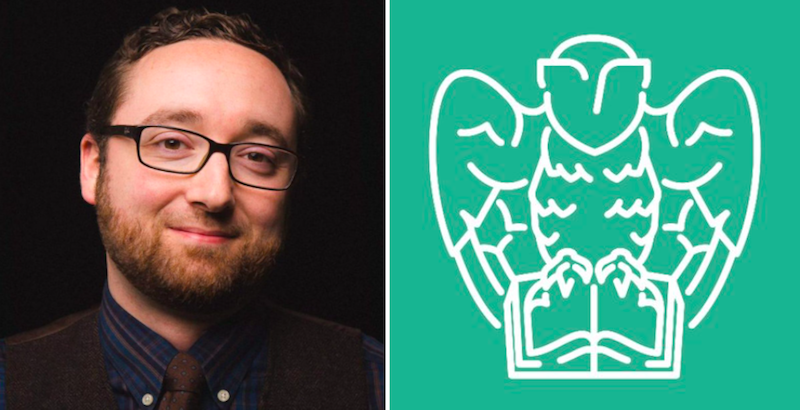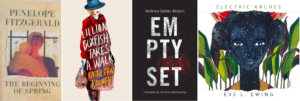
Welcome to Secrets of the Book Critics, in which books journalists from around the US and beyond share their thoughts on beloved classics, overlooked recent gems, misconceptions about the industry, and the changing nature of literary criticism in the age of social media. Each week we’ll spotlight a critic, bringing you behind the curtain of publications both national and regional, large and small.
This week we spoke to Editor-in-Chief of the Chicago Review of Books, Adam Morgan.
*

Book Marks: What classic book would you love to have reviewed when it was first published?
Adam Morgan: One of my favorite novels—Penelope Fitzgerald’s The Beginning of Spring—received great reviews in 1988, but no one seems to read it anymore. It is achingly beautiful, weird, hilarious, and a fascinating look at a British printing press in Moscow on the eve of revolution in 1913. I re-read it every March to remind myself to slow down and appreciate the season (even in Chicago, when the “beginning of spring” is often in April or May).
BM: What unheralded book from the past year would you like to give a shout-out to?
AM: If we’re talking about the last 12 months, Verónica Gerber Bicecci’s Empty Set absolutely blew me away, but didn’t get the mass attention I thought it deserved. You can read it in one sitting, and finish with the feeling of a caffeine high. Also, Eve Ewing’s Electric Arches was a landmark moment for Chicago, and while it received some great press, it didn’t garner a ton of critical attention because poetry often gets shortchanged by review outlets; for proof, see this summer’s reading guides in the New York Times and the Washington Post.
If we’re talking about the past calendar year, Kathleen Rooney’s Lillian Boxfish Takes a Walk is one of the greatest New York City novels I’ve ever read. She captures the city from the perspective of a flâneuse, especially during the 1930s, and while it was reviewed well and widely, I thought it belonged on every best-of-2017 list.
BM: What is the greatest misconception about book critics and criticism?
AM: I often hear that criticism isn’t art—that critics are somehow less worthy of eternal glory than novelists or poets. And I blame this misperception on two confusing terms.
First, criticism itself, because it conflates “writing about books” with “criticizing” things. You see this all the time, like when celebrities complain on Twitter that “critics are just haters who can’t make art themselves.” I wish we had a different term for critics and cultural criticism, something without negative connotations, but that’s English for you.
Second, the word review. I think the general public equates a “review” with a brief yes-or-no opinion, like those 30-second summaries Ebert and Siskel used to do on “At the Movies.” Obviously, those “capsule” reviews do exist in the book world, thanks to trade publications like Publishers Weekly and Shelf Awareness, and obviously, they’re valuable for industry insiders, and an artform all their own.
But that’s a completely different genre from literary criticism, and we call both things “reviews.” Good critics don’t just flash you a thumb’s up or a thumb’s down, they tap you on the shoulder and introduce you to a fascinating conversation. They don’t just consider the book in question, but the other works it responds to, the rest of the author’s writing, cultural and political context—anything that helps explain why the book matters and what it tastes like, so to speak. Good criticism is just good creative nonfiction.
BM: How has book criticism changed in the age of social media?
AM: I started writing about books in 2009 (for Jessa Crispin at Bookslut, may it rest in peace), so I’ve never known a publishing landscape without Facebook or Twitter. But I imagine social media democratized the conversation a little bit. Along with DIY web publishing, it provided a platform for marginalized communities and writers who didn’t have direct access to huge media outlets. Even just fifteen years ago, if you weren’t an established critic at a major publication, you had zero delivery channels at your disposal.
On the other hand, social media has made everyone (who uses it) more visible, more accessible, and more connected. That can be challenging when you’re a critic, especially if you’re also an editor, a novelist, a poet, etc. Critics and their editors are adamant about avoiding conflicts of interest, but the literary world isn’t exactly huge, and at some point of singularity in the future, we’ll all be Facebook friends and Twitter buddies, and how do you write honestly about a friend’s work of art?
BM: What critic working today do you most enjoy reading?
AM: I know Parul Sehgal has become a clichéd answer to this question, but that’s because she’s so good at distilling and conveying ideas in a beautiful way. I read every word she writes. I also anxiously await every new review from two Chicago critics, Kathleen Rooney and Charles Finch. I love the way Kathleen’s mind works, and Charles usually makes me laugh while giving me nine things to google. And then there are a few critics who I follow religiously—Gabby Bellot, Britt Julious, Amy Brady, Amber Sparks—who mostly write about books in other ways (e.g., profiles, essays, features), with the same depth and scope.
*
Adam Morgan is the editor-in-chief of the Chicago Review of Books, a contributing writer at Chicago magazine, and a book critic for the Minneapolis Star-Tribune. His writing has also appeared in The Paris Review Daily, The Guardian, Chicago Tribune, Poets & Writers, and elsewhere. He tweets at @adamm0rgan.
*
· Previous entries in this series ·
If you buy books linked on our site, Lit Hub may earn a commission from Bookshop.org, whose fees support independent bookstores.

